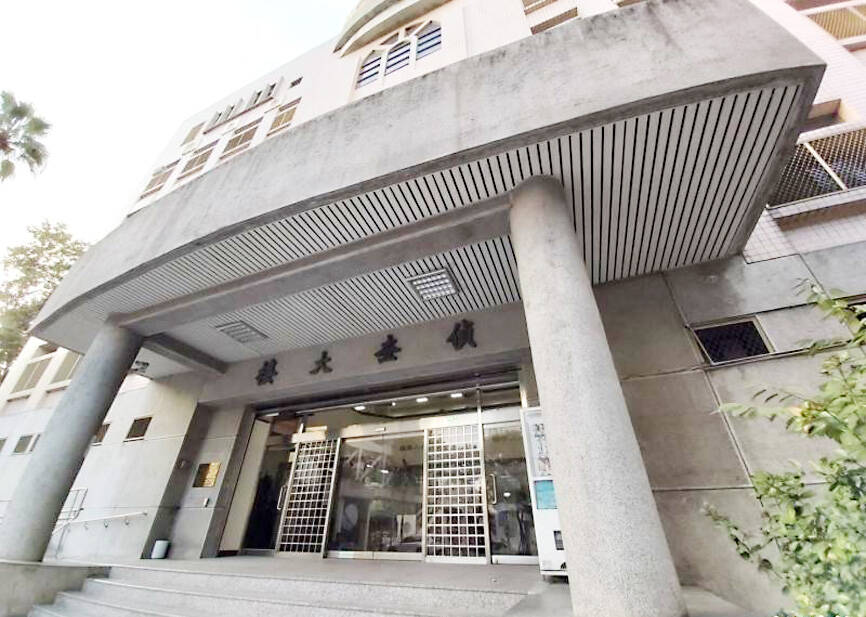The New Taipei District Prosecutors’ Office yesterday questioned 14 New Taipei City borough wardens and other residents for allegedly taking a Beijing-funded trip in exchange for supporting political candidates favored by China in next month’s elections.
A New Taipei City borough warden surnamed Hsu (許) and a businesswoman surnamed Chen (陳) were questioned about alleged contraventions of the Anti-Infiltration Act (反滲透法), the Presidential and Vice Presidential Election and Recall Act (總統副總統選舉罷免法) and the Public Officials Election and Recall Act (公職人員選舉罷免法), the office said.
They were each released on bail of NT$500,00, it said.

Photo: Wang Ting-chuan, Taipei Times
The duo is accused of arranging a free trip for wardens from Nov. 21 to 24 in China’s Jiangsu Province at the behest of local Taiwan affairs officials, it said.
The scheme targeted wardens in New Taipei City’s Tucheng (土城), Jhonghe (中和), Yonghe (永和), Banciao (板橋) and Shulin (樹林) districts, the office said, adding that they were either Chinese Nationalist Party (KMT) members or political independents.
About 10 wardens and the same number of their friends and family went on the trip, with the former paying nothing and the latter paying only for airplane tickets, it said.
Hsu, Chen and Chinese officials told members of the tour group during banquets which political party they should support, the office said.
The other wardens were questioned about taking a bribe for their vote and allegedly breaching the Criminal Code. They were released with travel restrictions, except for a warden surnamed Chu (朱), who was released on NT$30,000 bail, the office said.
Meanwhile, the Keelung District Court yesterday approved the pretrial detention of Wu Shih-chin (吳石金), a Keelung borough warden, the first warden to be held in pretrial detention in connection with China’s alleged trips-for-votes scheme.
Wu faces indictments on charges related to breaching the Anti-Infiltration Act and election laws.
Yesterday’s hearing was the third time the issue of Wu’s detention was heard at the court, after its previous decisions were overturned.
The latest ruling represented a reversal from the court’s second ruling to release Wu on NT$50,000 bail.
Wu had been to China six times and deleted the chat history on his smartphone, showing that he would present a flight risk and there was the danger of evidence tampering were he to be released, the presiding judge said.
The warden of Siaogang Borough (孝岡) in Keelung’s Sinyi District (信義), Wu is accused of leading 12 wardens and 11 other people on a Beijing-funded tour of China’s Shandong Province from Nov. 21 to 26, the Keelung District Prosecutors’ Office said.
Members of the tour group paid a token fee of NT$5,500 and each received 1,000 yuan (US$141) in cash upon their arrival, the office said, adding that Chinese officials urged them to vote for the KMT throughout the trip.

The US government has signed defense cooperation agreements with Japan and the Philippines to boost the deterrence capabilities of countries in the first island chain, a report by the National Security Bureau (NSB) showed. The main countries on the first island chain include the two nations and Taiwan. The bureau is to present the report at a meeting of the legislature’s Foreign Affairs and National Defense Committee tomorrow. The US military has deployed Typhon missile systems to Japan’s Yamaguchi Prefecture and Zambales province in the Philippines during their joint military exercises. It has also installed NMESIS anti-ship systems in Japan’s Okinawa

‘WIN-WIN’: The Philippines, and central and eastern European countries are important potential drone cooperation partners, Minister of Foreign Affairs Lin Chia-lung said Minister of Foreign Affairs Lin Chia-lung (林佳龍) in an interview published yesterday confirmed that there are joint ventures between Taiwan and Poland in the drone industry. Lin made the remark in an exclusive interview with the Chinese-language Liberty Times (the Taipei Times’ sister paper). The government-backed Taiwan Excellence Drone International Business Opportunities Alliance and the Polish Chamber of Unmanned Systems on Wednesday last week signed a memorandum of understanding in Poland to develop a “non-China” supply chain for drones and work together on key technologies. Asked if Taiwan prioritized Poland among central and eastern European countries in drone collaboration, Lin

NO CONFIDENCE MOTION? The premier said that being toppled by the legislature for defending the Constitution would be a democratic badge of honor for him Premier Cho Jung-tai (卓榮泰) yesterday announced that the Cabinet would not countersign the amendments to the local revenue-sharing law passed by the Legislative Yuan last month. Cho said the decision not to countersign the amendments to the Act Governing the Allocation of Government Revenues and Expenditures (財政收支劃分法) was made in accordance with the Constitution. “The decision aims to safeguard our Constitution,” he said. The Constitution stipulates the president shall, in accordance with law, promulgate laws and issue mandates with the countersignature of the head of the Executive Yuan, or with the countersignatures of both the head of the Executive Yuan and ministers or

CABINET APPROVAL: People seeking assisted reproduction must be assessed to determine whether they would be adequate parents, the planned changes say Proposed amendments to the Assisted Reproduction Act (人工生殖法) advanced yesterday by the Executive Yuan would grant married lesbian couples and single women access to legal assisted reproductive services. The proposed revisions are “based on the fundamental principle of respecting women’s reproductive autonomy,” Cabinet spokesperson Michelle Lee (李慧芝) quoted Vice Premier Cheng Li-chiun (鄭麗君), who presided over a Cabinet meeting earlier yesterday, as saying at the briefing. The draft amendment would be submitted to the legislature for review. The Ministry of Health and Welfare, which proposed the amendments, said that experts on children’s rights, gender equality, law and medicine attended cross-disciplinary meetings, adding that